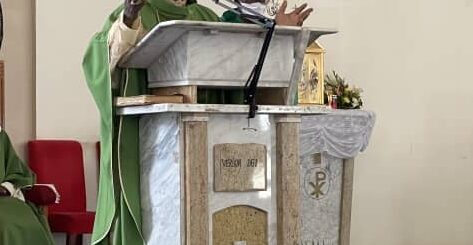The Eucharist, the Sacrament of Love and Unity
by ARCH BISHOP · June 2, 2024
Corpus Christi – Solemnity of the Body and Blood of Christ, at St. Michael’s Catholic Church, Piwoyi, Abuja, 2nd June 2024. Homily by Archbishop I. A. Kaigama.
Readings: Ex 24:3-8; Heb. 9:11-15; Mk 14:12-16.22-26
The Eucharist, the Sacrament of Love and Unity
Recently, on social media, some Pentecostal pastors have been heaping surprising praises on the Catholic Church, referring to her as the most highly organized spiritual institution in the world. One of them observed that the Catholic Church does not give you flyers to invite you to come to her church or post adverts on billboards, but the Church keeps growing.
One pastor attributed the growth of the Catholic Church to the constant celebration of the body and blood of Christ. He revealed that priests celebrate Masses every day even if they are alone; and that Catholics go to church on Sundays even if it is raining, for the love of the Eucharist.
Another pastor said Catholics think like kings: they go to a place, settle in the most abandoned area, and 15 years later, the place is flourishing and has become the part of town everyone wants to settle in. He said if you go to any village, any Arab nation; go to Dubai, you will find Catholics there. According to him, the King of Dubai cannot give just anyone a license to start a church there, but he gives it easily to the Catholic Church. He said the Catholics can enter any hostile territory. This, the pastor attributed to the power of the Eucharist.
These preachers admit that Catholics don’t go to church only in search of miracles or prophecies or to see the Rev. Father and to hear the eloquent delivery of his sermon. They concluded that Catholics go to church to worship Christ in the Blessed Sacrament. They stated that, if you transfer a priest, Catholics will still go to the same church when another priest is brought. The people remain there because they are not channeled to a priest – they are channeled to the Blessed Sacrament, the Holy Eucharist, the food of life.
What these pastors said is very correct. The Eucharist is the source and summit of Catholic life. On this sacred feast of Corpus Christi, we celebrate the profound mystery of the Eucharist, the gift of Christ’s Body and Blood, for our salvation. From the Eucharist comes all the power we need and to it all our life is directed. Jesus, says, “He who eats my flesh, abides in me and I in him” (John 6:57).
St. Thomas Aquinas referred to the Eucharist as “The Sacrament of love.” St. Ignatius of Antioch called it the “medicine of immortality.” After consecration by a validly ordained priest, we believe that the bread and wine become the true body and blood of our Lord Jesus Christ. Christ is present, body, blood, soul, and divinity.
The first reading today refers to the old covenant between God and His people Israel, achieved by Moses sprinkling the blood of a sacrificed animal on the altar and on the people. The Gospel dwells on the new and eternal covenant, while the second reading contrasts the old covenant (based on animal sacrifices) with the new covenant (through Christ’s sacrifice).
In the Holy Eucharist, Jesus invites the saints and sinners; the afflicted and pained; the young and old, the rich and poor. A worthy reception therefore should bring about a transformation in life and conduct. In like manner, we expect a sincere change each time Nigerian officials make the national pledge, take the oath of office, or sing the national anthem. It is very amazing how officials soon forget or ignore such phrases as: “I pledge to Nigeria my country. To be faithful, loyal, and honest” and turn around to fatally wound the nation and its people by acts of blatant corruption and gross dishonesty. While returning to the old national anthem is not a problem for me, because it contains some gracious, patriotic, and prayerful words, the fact is that many of us, unfortunately, rubbish these phrases: “In brotherhood we stand,” “let truth and justice reign,” “build a nation where no man is oppressed” in the unholy and nauseating acts of corruption witnessed in private and public lives.
The people of Israel in the desert grumbled against Moses and against God. Their suffering lasted only 40 years. The journey of Nigeria through the desert of poverty and suffering seems to be going on for more than sixty years, since independence in 1960. By reverting to our former National Anthem, we hope that our political leaders will allow our socio-economic fortunes to change for the better too; we should progress from religious and tribal parochialism to genuine patriotism; merit should prevail when interviews are conducted for employment, promotion, admission, political appointments, etc., instead of relying heavily on the recommendations of godfathers or godmothers. When a criminal is arrested for corruption, kidnapping, violence, or terrorism, such a person should not be assisted to evade justice because he/she is the son or daughter of a certain tribe or belongs to a certain religion. We hope that the hasty passing of the National Anthem Bill with accelerated presidential endorsement will usher in a revolutionary transformation in governance and an unprecedented emancipation from hunger, poverty, insecurity, disease, violence, etc.
Today, in St. Michael’s Catholic Church, Piwoyi, we shall be confirming 153 candidates and 19 couples will be receiving the sacrament of matrimony. The newly constituted leaders of the Laity Council in the Archdiocese will also be inaugurated. Piwoyi in Gbagyi means “new house.” We hope our brothers and sisters will become a new dwelling of the Holy Spirit and receive the strength to do the will of God.
With the help of the Eucharist, let us endeavour to build a church, a nation, and a world where all are welcomed and valued as children of God.




